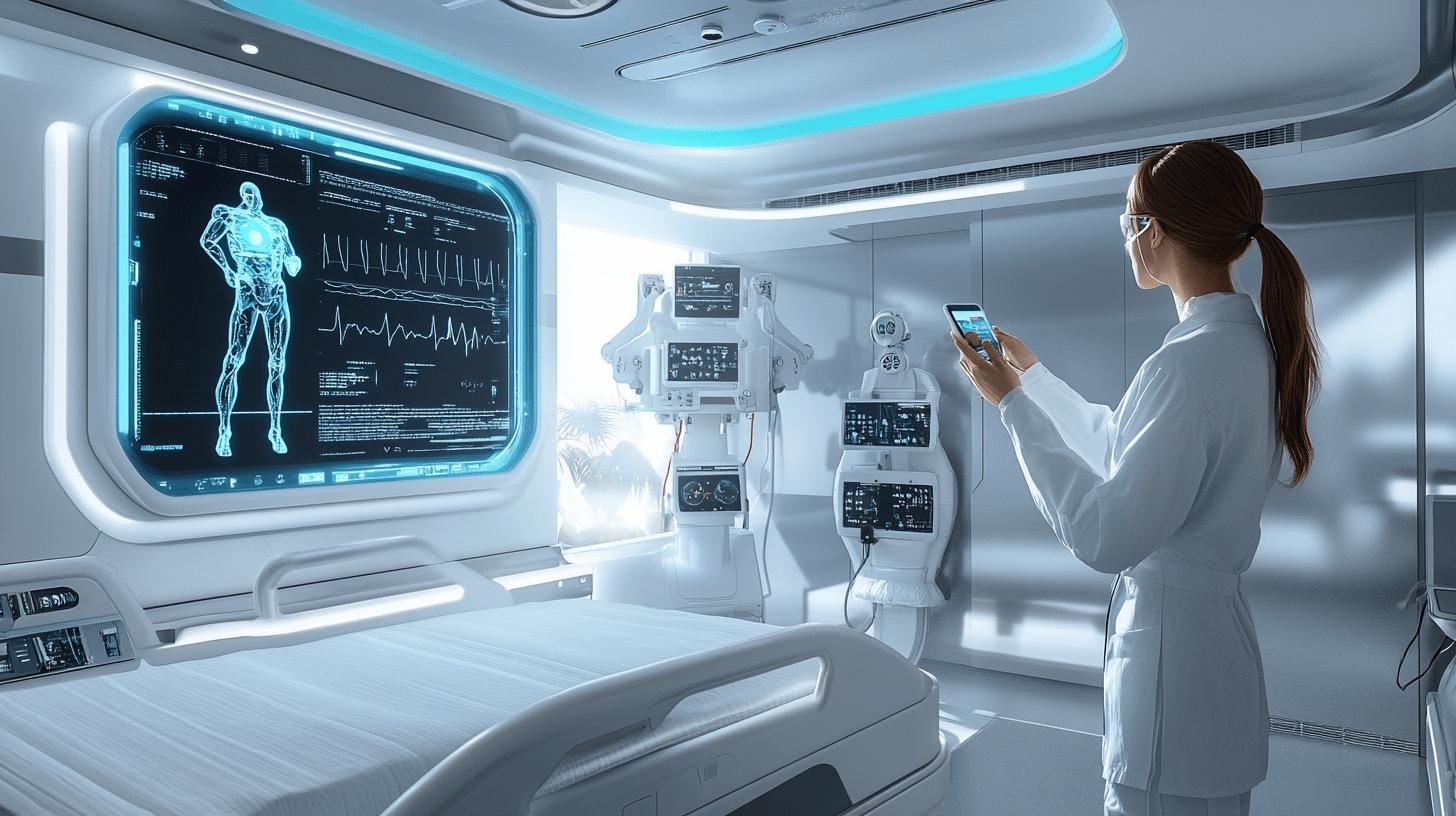Have you ever wondered how a machine detects your ailments? Sounds like sci-fi, but AI in healthcare is the real deal today! From handling your incomplete medical history to predicting diseases with lightning speed, AI’s got it covered. Imagine robots assisting in surgery, reducing complications, and speeding up your recovery—fascinating, right? So, how is AI used in health care today? In this article, we will explore how AI applications like diagnostics, patient monitoring, and drug development are transforming healthcare.
How Is AI Used in Healthcare Today?
How is AI used in healthcare today?
AI is showing up everywhere in healthcare, making a big impact. It helps with everything from diagnosing diseases to handling administrative tasks. Imagine it as a super smart assistant that manages tons of medical records effortlessly. AI predicts diseases faster and enables more precise robotic surgeries, improving healthcare efficiency and accuracy.
So, how is AI used in healthcare today? Here are five ways AI is transforming healthcare:
- Diagnostics: AI aids doctors in detecting diseases earlier and more accurately.
- Patient Monitoring: It monitors patients’ health, alerting to potential issues before they escalate.
- Drug Development: AI accelerates the discovery of new drugs, reducing time for market entry.
- Medical Imaging: It enhances scan and image quality, simplifying diagnostics for doctors.
- Administrative Tasks: AI manages routine paperwork and scheduling, allowing healthcare professionals to focus on patients.
By getting into these spheres, AI boosts the accuracy and speed of healthcare services. Doctors can make better diagnoses, aided by AI’s capability to analyze vast data amounts. Additionally, robotic surgeries cut patient recovery times. AI offers healthcare professionals a significant advantage, enabling them to perform tasks more efficiently and effectively.
The Benefits and Challenges of AI in Healthcare

AI is transforming healthcare, making it quicker and better for all involved. Think of it as a superhero sidekick assisting with disease diagnosis and treatment planning while handling mundane administrative tasks. The major win? Improved patient outcomes and an enhanced hospital experience.
But to buttress further, how is AI used in healthcare today? Let’s have a glimpse into AI’s benefits in healthcare:
- Optimized Diagnostics: AI aids in earlier disease detection, leading to more effective treatments.
- Treatment Planning: It provides personalized care plans through extensive data analysis.
- Administrative Efficiency: AI handles scheduling and paperwork, reducing wait times.
- Better Patient Monitoring: It tracks vital signs, notifying doctors of any changes.
However, implementing AI in healthcare isn’t without challenges. Questions about ethics and privacy abound. How can we ensure patient data security? What about biases in AI models affecting diverse populations? It’s essential to ensure that these technological tools remain fair and secure.
Balance AI with human expertise is crucial. While AI offers smart solutions, it cannot replace a doctor’s empathy and intuition. By working together, AI and healthcare professionals can deliver top-notch personalized care, using technology to enhance the human touch in patient care.
AI in Healthcare: Real-World Examples and Case Studies
AI in healthcare is not just a sci-fi concept; it’s happening now and creating waves. Real-world AI applications are changing how we treat and manage diseases. Think of AI as an untiring assistant, integrated into projects managing type 1 diabetes, enhancing ADHD diagnostics, and improving radiology images’ clarity. Companies like EliseAI and Flatiron Health lead, pushing AI’s healthcare boundaries.
These examples represent just a fraction of AI’s potential in healthcare. By enhancing diagnosis accuracy and accelerating treatment processes, AI assists doctors in making informed decisions faster. It’s akin to giving healthcare a superpower, enabling quick human-generation data analysis. As AI evolves, its significance in healthcare will intensify, becoming an indispensable tool for medical professionals—it’s transforming the industry positively.
The Future of AI in Healthcare: Trends and Innovations

AI in healthcare promises substantial enhancements, like improved patient outcomes and safer treatments. It’s all about reducing human error and making healthcare smarter and more efficient. Imagine a future where diagnostics are not just swift but highly accurate, and treatments are personalized. It feels like a sci-fi scenario, but it’s actually reality!
Here’s how AI is making significant changes:
- Diagnostics: AI tools aid faster and more precise disease diagnosis.
- Personalized Treatment: Through data analysis, AI crafts patient-specific treatment plans.
- Disease Prevention Analytics: AI foresees health issues before they become serious.
- Human-AI Collaboration: Doctors and AI collaborate, merging technical insights with human intuition.
Combining AI’s analytical power with doctors’ empathy forms the ultimate team. While AI identifies patterns and interprets data, human clinicians add compassion and a personal touch. This synergy is shaping a healthcare system that’s not just more efficient but more humane. It is truly the best of both worlds, with a promising future ahead!
Ethical and Regulatory Considerations of AI in Healthcare
In healthcare, ethics and regulations are crucial for AI’s development. The reason? Sensitive patient information and decisions affecting lives are involved. Safeguarding responsible and secure AI use demands firm guidelines protecting everyone.
Key ethical concerns include:
- Data Privacy: Ensuring patient information remains secure and confidential.
- Algorithm Biases: Ensuring AI models provide fair treatment across all demographics.
- Transparency: Clearly communicating how AI operates and the data it employs.
- Accountability: Holding developers and users responsible for AI outcomes.
For AI to truly benefit healthcare, transparency and patient involvement in its deployment are necessary. Patients must understand how their data is used and have a say in AI development. Trust-building and ensuring AI serves its intended audience are fundamental steps forward.
Conclusion
How is AI used in healthcare today? From diagnosing diseases to assisting in surgeries, AI applications in healthcare today have completely improved. It’s clear AI is reshaping diagnostics, patient care, and even daily admin tasks. Balancing the pros like improved outcomes with challenges like privacy is key.
Exciting real-world examples show how AI powers advancements in ADHD diagnosis and diabetes management. The future looks bright with trends centered around personalization and smarter diagnostics.
While ethical issues remain, the potential benefits are massive. With AI’s role expanding, healthcare can become more accurate, efficient, and compassionate. Exciting times ahead!
FAQ
How is AI used in healthcare today?
AI in healthcare today handles medical diagnosis, patient monitoring, drug development, imaging, and administrative tasks. It’s used to predict diseases, streamline processes, and enhance surgery precision.
What are the benefits of AI in healthcare?
AI optimizes diagnostics and patient care, boosts treatment planning, and increases administrative efficiency. It leads to better patient outcomes and streamlines healthcare services.
What are the disadvantages of AI in healthcare?
AI faces challenges like ethical issues, data privacy concerns, and the need for diverse model validation. It involves complex regulatory processes to ensure safe use.
Can you give a real-world example of AI in healthcare?
AI helps manage type 1 diabetes and improves ADHD diagnosis. It’s used in radiology to enhance imaging and disease detection, showing its diverse application.
What is the smart use of AI in healthcare?
Smart AI use improves diagnostic accuracy, patient monitoring, and personalized treatment plans. It complements clinicians by handling large data sets efficiently.




